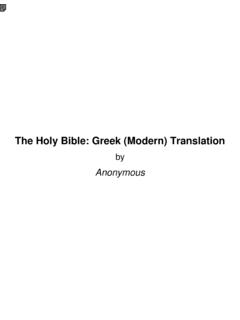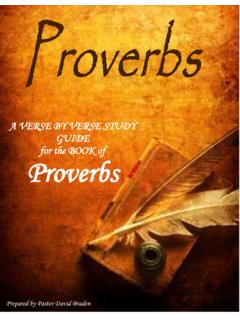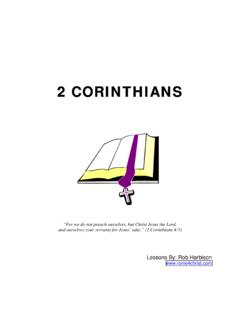Transcription of Biblical Studies From The Book Of Hebrews - Bible Study Guide
1 Biblical Studies FromThe Book Of HebrewsPrepared By Jeff SmithIIIIIIIVVVIVIIVIIIIXXIIIIIIIVVVIVII VIIIIXXT able Of ContentsLesson IntroductionThe Superior Spokesman (His Divinity & Humanity)The Superior Spokesman (Belief In Him)The Superior Spokesman (His Priesthood)The Superior Covenant (A More Excellent Ministry)The Superior Covenant (The Covenants Contrasted & The 2nd Covenant s Superior Sacrifice)The Superior Covenant (Privileges & Obligations Of The 2nd Covenant, And The Need For Endurance Through Faith)The Superior Covenant (Examples Of Enduring Faith)Concluding Exhortations (The Example Of Christ & The Value Of Discipline)Concluding Exhortations (The Contrast Of The Two Mountains & The Stability Of The Kingdom)Concluding Exhortations (Various Admonitions & Benediction)Appendix (Charts)12345678910111610131820242832353 841 IIIIIIIVVVIVIIVIIIIXXIIIIIIIVVVIVIIVIIII XXC opyright 2005.
2 Permission is granted from the author forfree distribution of this material, but only as it Superior Christ & His CovenantBiblical Studies From The Book Of HebrewsLesson 1 General IntroductionOverviewOftentimes, while watching or reading some magazine, one will come across an advertisement thatpromotes a new and improved product. The makers of this product emphasize all the favorite featureshave been retained, but there have been improvements made that make the product all the more valuableand consumers cannot do a concept is not just for commercials. This notion also seems to be the theme of one of the NewTestament s more prevalent book of Hebrews .
3 Indeed, there has never been a time whenGod has left man bereft of His revealed will. He has always spoken to us (1:1-2). Viewing the Scriptureas a series of revelations (from the patriarchs to the prophets to Christ), what God says to us todaythrough His Son is the ultimate in improvements. What was once promised to last until its completefulfillment (cp. Mt. 5:17-19) eventaully became ready to be replaced with something superior (cp. 8:13).God has always interacted with man based on covenants, or agreements. There is now no greatercovenant than what can be found in Christ. Patriarchal covenants were limited to the family to whomthey were addressed (who else but Noah s family were told about the flood and the life-saving ark?)
4 The covenant through Moses certainly alienated Gentiles (cp. Deut. 5:2-3; Eph. 2:12), and was unableto completely give Jews what was from the problem of sin (cp. 7:18-19; Rom. 8:3).Yet, now we have a covenant that will not and cannot be outdone. Saints are reminded of this greatsalvation (2:3), and told to cling to Him who offers Sympathizer (4:15) and Sacrificer (7:27).Obviously, the title of Hebrews tells of the flavor of the book. It was written to Jewish Christians who hadgraduated from the inferior covenant of the Mosaic Law to the gospel of Jesus Christ (cp. 6:4-5). Itspresentation follows a grand thought process in which the Holy Spirit attempts to show just how valuablelife is in Christ, and how foolish it is to come to Jesus only to go back to an inferior way of living (cp.)
5 6:6).Needless to say, one attempting to Study this book will be hindered if he does not have a good, generalunderstanding of the Old allow the author to state the purpose done at the end of the epistle. He wrote toexhort or encourage these Jewish Christians (13:22). No matter how lofty or grandeur his presentationmay seem to be throughout the book, his aim was a practical one. These Jewish believers wereobviously being tempted to return to the ancient covenant of their forefathers. Pressure to do so musthave been immense from family, friends, etc. However, they needed exhorting to remain true to today, saints need to be encouraged or exhorted to remain faithful and true to Christ.
6 No matterhow committed one may begin his walk with the Lord, he will be faced with temptation to quit. Hope can1 The Superior Christ & His CovenantLesson 1eventually fade. He may even forsake assembling with other believers (10:25). Such apostasy can evenbecome complete and irrevocable (6:1-6; 10:26-31).We, too, can fall from grace (Gal. 5:4). We can regress back to whatever inferior religion we left when wecame to Christ. The parallels are obvious to our situations today. Christians need constant reminding andexhorting to cling to Christ and not fall into apostasy. Though not initially written to us, Hebrews will alwaysbe a relevant Study for New Testament Christians to is stated early and emphasized often throughout the , as Son, Heir, and Creator, is also the final Spokesman in the final covenant.
7 As Neil Lightfootstates in his commentary Jesus Christ Today, the superiority of Christ and His covenant is emphasizedin many ways throughout the epistle. Notice these: Through sacrificesPriests offered sacrifices to atone for man s sins. However, no dumb, dead animal was offeredon our behalf. Jesus offered Himself alive (9:13-14). Nor was it like the offerings that had to becontinually sacrificed. Jesus offered Himself once for all time to save us (10:1-3, 11-12). Through the sanctuaryThe old covenant had regulations re: the worship of Jehovah. The Holy & Most Holy Placeswere no doubt resplendent with glory with all they represented.
8 However, they were inadequatebecause the common people could not enter into the Holy Place (cp. Num. 3:10) the priests could not enter into the Most Holy Place (cp. Lev. 16) the high priest could only enter the Most Holy Place once a year (cp. Lev. 16)All of this tells us the Jewish system offered no real access to heaven itself. Yet, today we havecomplete and full access to heaven through the death of Christ (9:11-12, 23-24).AuthorPerhaps no other aspect of Hebrews has been debated as much as who wrote it. Shamefully, many Biblestudents spend more time on this than they do attempting to learn its message.
9 We are not able to go anyfarther on this point than the Scripture will allow us. We are not told who wrote this epistle; the author isanonymous. God, after He spoke long ago to the fathers in the prophets in many portions and inmany ways, in these last days has spoken to us in His Son, whom He appointed heirof all things, through whom also He made the world (1:1-2). [NASV]2 The Superior Christ & His CovenantLesson 1 Even though Hebrews is anonymously written, some information about the author can be found within thebook. Consider the following: He was familiar with his readers (5:12; 6:9) He was also familiar with Timothy (13:23) He had been with his readers previously and longed to be reunited with them (13:19)The most popular choice among writers as being the author of Hebrews has been the apostle many reasons, supporters of a Pauline authorship point to the closing verses in Heb.
10 13 and hisremarks about Timothy, reminding us they are similar to statements he makes about his young comrade inhis other only have one word of should take notice of one passage we believe has somebearing on the authorship issue Heb. 2:3. Whoever wrote Hebrews appears not to have been anapostle of Jesus. He also appears to have been one to whom the apostles had confirmed the Lord s would rule out the apostle Paul (cp. Gal. 1:11-17).Thankfully, we do not need to know who wrote the book in order to know what the book the authorship aspect, we also cannot be dogmatic about when Hebrews was written. However, theinternal evidence seems to indicate the epistle was written prior to Jerusalem s destruction in 70.












